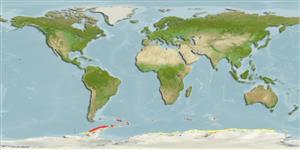>
Perciformes/Notothenioidei (Icefishes) >
Nototheniidae (Cod icefishes) > Nototheniinae
Etymology: Nototheniops: Greek, noton = filament + Greek, adverbial particle, then, that denotes distance or removal + Greek, opsis = appearance (Ref. 45335); larseni: Named for Captain C.A. Larsen, chief navigator of the Swedish Antarctic Expedition (Ref. 11892).
Eponymy: Carl Anton Larsen (1860–1924) was a Norwegian Antarctic explorer. [...] (Ref. 128868), visit book page.
More on author: Lönnberg.
Environment: milieu / climate zone / depth range / distribution range
Ecologia
marinhas bentopelágico; intervalo de profundidade 30 - 750 m (Ref. 51730). Polar; 51°S - 70°S, 92°W - 166°E
Southern Ocean: Balleny Islands, Peter I Island, Palmer Archipelago, Graham Land, South Shetlands, South Orkneys, South Sandwich, South Georgia, Shag Rocks, Bouvet, and sub-Antarctic islands and seamounts of the Indian Ocean Sector (except Kerguelen, Heard, McDonald and Macquarie islands and Kara Dag seamount).
Comprimento de primeira maturação / Tamanho / Peso / Idade
Maturity: Lm 22.5 range ? - ? cm
Max length : 24.0 cm TL macho/indeterminado; (Ref. 5179)
Espinhos dorsais (total) : 5 - 6; Raios dorsais (total) : 37 - 39; Raios anais : 37 - 38. Irregular oblique dark cross-bars on body. Distal part of spinous dorsal with black blotch, soft dorsal with oblique dark stripes. Anal plain or similarly marked. Breast to middle depth of pectoral fins a notable silvery-white (Ref. 11892).
Feeds mainly on krill, hyperiid amphipods and mysids. Spawning occurs in autumn and winter (Ref. 51730).
Dewitt, H.H., P.C. Heemstra and O. Gon, 1990. Nototheniidae. p. 279-331. In O. Gon and P.C. Heemstra (eds.) Fishes of the Southern Ocean. J.L.B. Smith Institute of Ichthyology, Grahamstown, South Africa. (Ref. 5179)
Status na Lista Vermelha da UICN (Ref. 130435: Version 2024-1)
Ameaça para os humanos
Harmless
Uso pelos humanos
Pescarias: espécies comerciais
Ferramentas
Relatórios especiais
Baixar XML
Fontes da internet
Estimates based on models
Preferred temperature (Ref.
123201): -1.4 - 1.9, mean 0 °C (based on 115 cells).
Índice de diversidade filogenética (Ref.
82804): PD
50 = 0.6250 [Uniqueness, from 0.5 = low to 2.0 = high].
Bayesian length-weight: a=0.00490 (0.00401 - 0.00598), b=3.22 (3.16 - 3.28), in cm total length, based on LWR estimates for this species (Ref.
93245).
Nível Trófico (Ref.
69278): 3.3 ±0.3 se; based on diet studies.
Generation time: 4.1 ( na - na) years. Estimated as median ln(3)/K based on 2
growth studies.
Resiliência (Ref.
120179): médio(a), tempo mínimo de duplicação da população 1,4 - 4,4 anos (K=0.27; Fec = 2,046).
Fishing Vulnerability (Ref.
59153): Low to moderate vulnerability (32 of 100).
Climate Vulnerability (Ref.
125649): Low to moderate vulnerability (32 of 100).
Nutrients (Ref.
124155): Calcium = 26.6 [16.3, 63.4] mg/100g; Iron = 0.454 [0.188, 0.884] mg/100g; Protein = 16.4 [15.1, 17.6] %; Omega3 = 0.414 [0.202, 0.819] g/100g; Selenium = 16.5 [6.5, 35.9] μg/100g; VitaminA = 33 [8, 144] μg/100g; Zinc = 0.532 [0.360, 0.790] mg/100g (wet weight);
